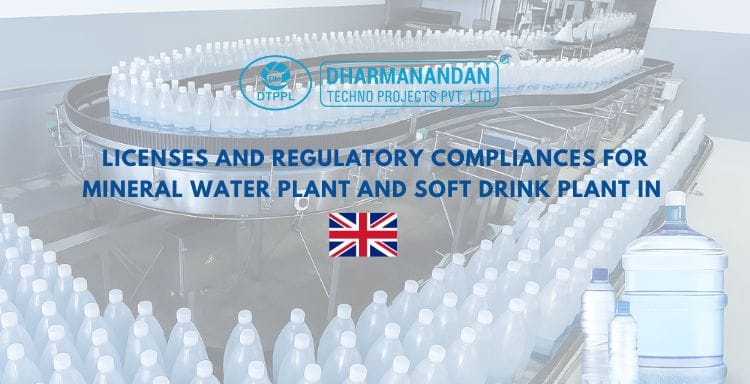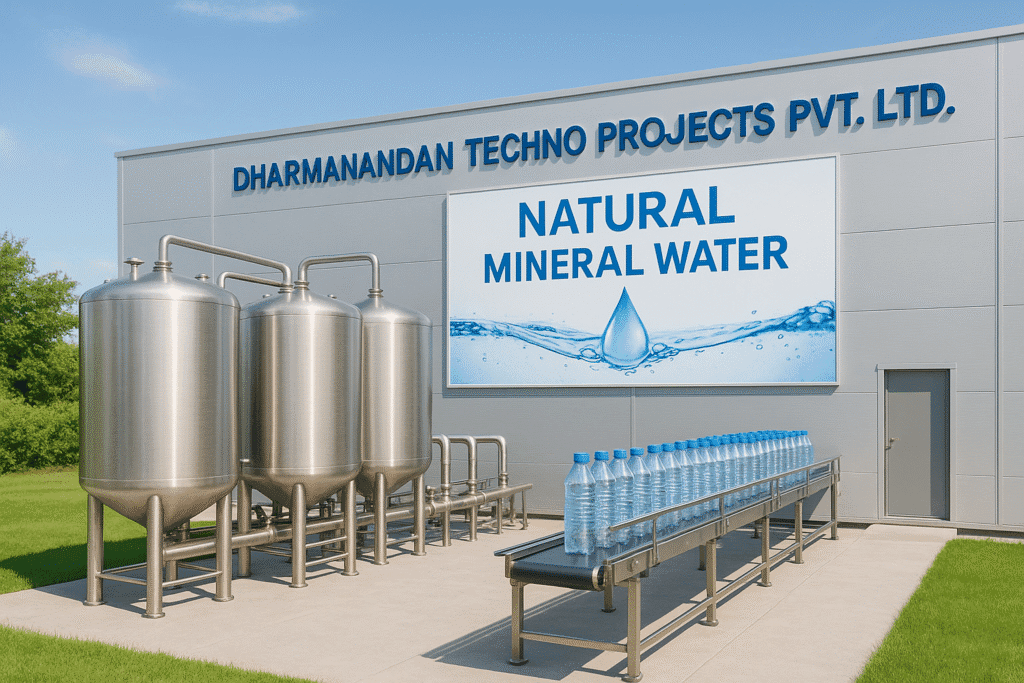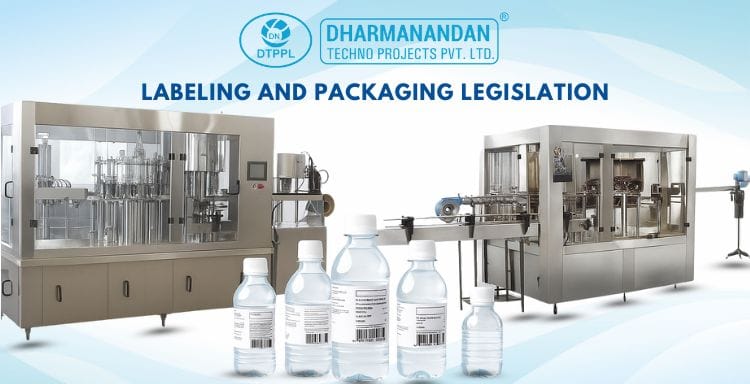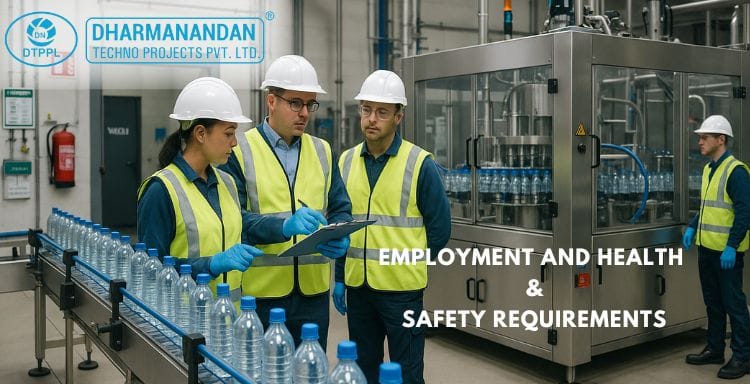
Table of Contents
Licenses and Regulatory Compliances for Mineral Water Plant and Soft Drink Plant in UK
June 24, 2025
The United Kingdom maintains a comprehensive legal and regulatory framework for the operation of food and beverage manufacturing facilities, including mineral water and soft drink plants. As demand for packaged beverages continue to remain steady across UK cities – from London to Manchester and Birmingham – businesses planning to establish or operate a natural mineral water plant or soft drinks plant must ensure compliance with multiple statutory requirements.
These regulatory protocols cover everything from licensing, water source validation, hygiene standards, labeling compliance and environmental safety. For operators evaluating the feasibility and legality of launching a new mineral water plant or a soft drink production line, knowledge of these rules is essential. This article outlines the mandatory licenses and regulatory expectations specific to the UK market.
1. Food Business Registration and Premises Approval
Before beginning production, any business intending to run a mineral water factory or soft drinks plant in the UK must register as a food business with the local authority. This process is legally required under UK food law and must be completed at least 28 days prior to commencing operations.
In some cases – especially if food processing involves high-risk products or specialized processes -premises may require official approval. This can apply to plants that produce bottle mineral water sourced directly from a spring or borehole, where treatment or unique storage applies.
Local environmental health officers may inspect the premises to assess hygiene design, workflow layout and risk control mechanisms. Production lines, including equipment such as Mineral water filling machines or Beverages Filling Machines, are also examined for compliance with safety standards.

2. Source Protection and Water Safety Regulation
In the UK, the regulation of water used in beverage production falls under the scope of the Drinking Water Inspectorate (DWI) and local environmental health departments. Operators of a natural mineral water plant must obtain recognition for their water source under natural mineral water, spring water or bottled drinking water classifications.
The following criteria must be addressed:
- Geographical and geological certification of the water source.
- Microbiological and chemical testing to verify purity and composition.
- Protection of the catchment area against contamination.
- Regular monitoring and reporting of source quality.
In Scotland, Wales and Northern Ireland, separate water authorities apply similar frameworks with region-specific application processes. Importantly, all sources used for human consumption must comply with the Natural Mineral Waters, which incorporate both national and EU-aligned standards.
3. Equipment Standards and Facility Hygiene Compliance
All machinery used in beverage manufacturing – including soft drink production lines and mineral water machines – must comply with UK food safety regulations. Equipment should be constructed of food-grade materials, support easy cleaning and avoid contamination risks.
Key considerations include:
- Fully enclosed bottling and filling zones to reduce microbial exposure.
- CIP (Clean-In-Place) systems for regular sanitization of tanks and pipelines.
- Proper drainage, ventilation and temperature control across the facility.
The Food Standards Agency (FSA) oversees implementation of the Hygiene Package Regulations, ensuring compliance with Hazard Analysis and Critical Control Points (HACCP). Each plant must maintain a written HACCP plan documenting hazard controls at each stage, from water intake to final packaging.

4. Labeling and Packaging Legislation
Bottled beverages sold in the UK must adhere to strict packaging and labeling regulations governed by the Food Information Regulations. Whether operating a beverages manufacturing unit or a mineral water plant, labels must contain:
- Product name and legal description.
- Ingredient list and allergens (if applicable).
- Quantity, batch number and use-by date.
- Name and address of the manufacturer or distributor.
- Source location especially important for natural mineral water plants
Additional labeling for nutritional content, sugar levels and flavoring types may apply to soft drinks. Misleading claims or unsubstantiated health benefits are prohibited. Labels should also comply with minimum type size and visibility requirements.
Failure to meet these standards can result in product withdrawal, penalties or reputational damage, emphasizing the importance of accurate label management and quality assurance practices.
5. Waste Management and Environmental Compliance
Plants producing bottled beverages must demonstrate proper waste management systems, especially with regard to packaging materials and water discharge. UK law mandates that businesses handling packaging over a specified threshold must register with the Environment Agency and contribute to recycling obligations under the Producer Responsibility Obligations (Packaging Waste) Regulations.
Effluent treatment and disposal, especially from operations using soft drinks filling machines or rinse water from mineral water filling machines, require consent or permits. Businesses may need to install on-site treatment facilities and comply with local sewage authority limits.
Additional areas of compliance include:
- Emission control (air and noise) for machinery.
- Water abstraction licensing if sourcing from a borehole or private supply.
- Energy efficiency measures linked to plant operations.
Environmental health officers and the Environment Agency conduct routine inspections to ensure adherence to pollution control and resource management regulations.

6. Employment and Health & Safety Requirements
Operating a mineral water factory or soft drinks plant involves responsibility for workforce welfare and workplace safety. This requires facilities to manage:
- Risk assessments for machinery, cleaning chemicals and production environments.
- Staff training for operating automated equipment, such as Soft Drinks Filling Machines.
- Maintenance logs for bottling and handling systems.
- Emergency response planning and personal protective equipment (PPE) provision.
Fire safety compliance, staff welfare facilities (e.g., changing rooms and sanitation) and protective infrastructure are non-negotiable elements of the regulatory framework.
7. Import, Export and Trade Standards
For beverage plants that intend to distribute products across UK borders or into international markets, additional standards must be addressed. Exporters must obtain health certificates from the relevant authority, depending on the destination.
Imported raw materials – such as flavorings or additives for soft drink lines – must also meet UK customs and safety regulations. Operators should verify supplier certifications and maintain traceability documentation as part of their food safety management system.
UK-based producers must also align with any changes in standards following post-Brexit regulatory divergence. Keeping production facilities updated with the latest guidance ensures trade readiness and continuous market access.
Conclusion
The regulatory environment for mineral water and beverages production in the UK is comprehensive, designed to ensure product safety, environmental responsibility and public health protection. From water source registration and hygiene protocols to labeling and waste management, compliance spans every operational aspect.
A new mineral water plant or a soft drink manufacturing setup – must integrate regulatory considerations into their facility design, workforce planning and technological investments. Investing in the right equipment, DTPPL offers mineral water filling machines and modular soft drink production lines, supports compliance while enhancing production efficiency.
About Author

Director – Global Marketing and Sales
Mr. Bhavesh from Dharmanandan Techno Projects Pvt. Ltd. has played a pivotal role in elevating the DTPPL brand to the global stage, leveraging his exceptional expertise in marketing and communications. He is committed to helping clients achieve significant growth while strengthening their own brands. Dharmanandan Techno Projects Pvt. Ltd. is a leading manufacturer and supplier of water purification systems and turnkey solutions for mineral water plants. With years of experience in designing and delivering high-quality water treatment solutions, the company provides end-to-end services, including system design, installation, maintenance, and ongoing support. Specializing in scalable and customizable water plants, DTPPL has successfully served industries worldwide, ensuring clean and safe drinking water across diverse applications.




